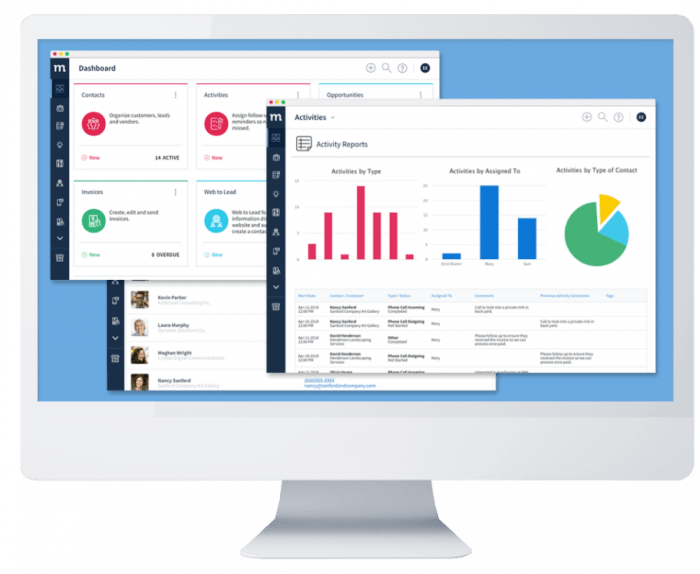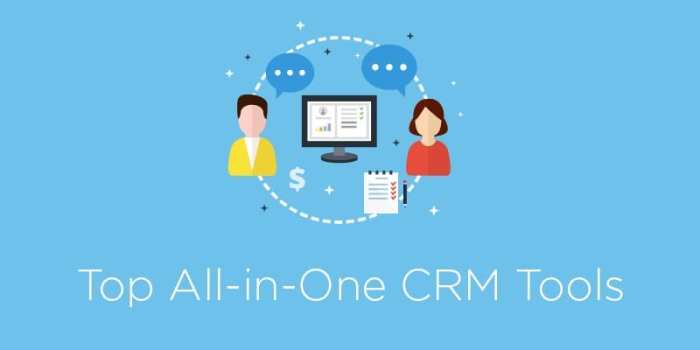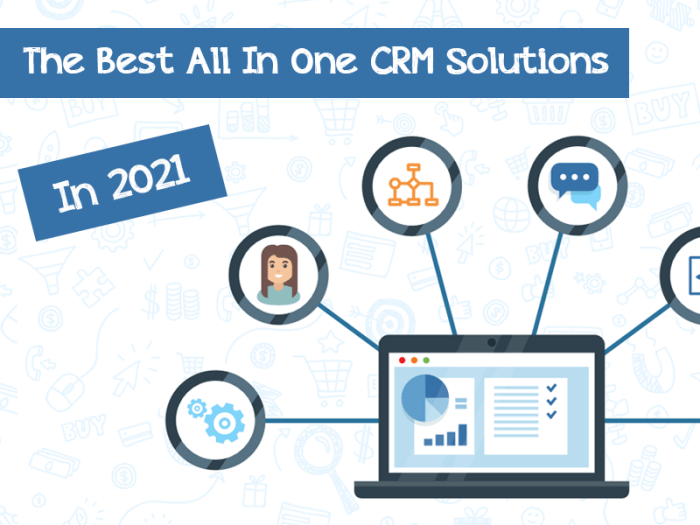All in one crm software – In today’s dynamic business landscape, efficient customer relationship management (CRM) is paramount. An all-in-one CRM software solution offers a consolidated platform to manage various aspects of customer interactions, streamlining workflows and boosting productivity. This comprehensive guide delves into the intricacies of all-in-one CRM software, exploring its features, benefits, selection criteria, and frequently asked questions.
Understanding All-in-One CRM Software
All-in-one CRM software, unlike specialized CRM systems focusing on specific functions, integrates multiple functionalities into a single, unified platform. This integration eliminates the need for multiple software applications and disparate data silos, fostering a more streamlined and efficient approach to customer management. Key features typically included are:
Core Features of All-in-One CRM Systems
- Contact Management: Centralized database for storing and managing customer information, including contact details, communication history, and purchase records. This allows for easy access to a complete customer profile.
- Sales Management: Tools for tracking leads, managing sales pipelines, forecasting sales, and automating sales processes. This improves sales team efficiency and predictability.
- Marketing Automation: Capabilities for automating marketing tasks such as email marketing campaigns, social media posting, and lead nurturing. This helps in targeted marketing and improved ROI.
- Customer Service/Support: Tools for managing customer inquiries, resolving issues, and tracking customer satisfaction. This improves response times and customer loyalty.
- Reporting and Analytics: Dashboards and reports providing insights into customer behavior, sales performance, and marketing effectiveness. This allows data-driven decision making.
- Integration Capabilities: Ability to integrate with other business applications such as email clients, accounting software, and e-commerce platforms. This creates a seamless workflow across different systems.
Benefits of Implementing All-in-One CRM Software: All In One Crm Software
Adopting an all-in-one CRM system offers numerous advantages for businesses of all sizes. These benefits translate to improved efficiency, increased revenue, and enhanced customer satisfaction.
Key Advantages of All-in-One CRM Solutions
- Improved Efficiency: Centralized data and automated workflows eliminate redundant tasks and streamline processes, freeing up valuable time and resources.
- Enhanced Collaboration: All team members have access to the same information, fostering better communication and collaboration across departments.
- Increased Sales Productivity: Sales teams can focus on closing deals rather than administrative tasks, leading to higher conversion rates and increased revenue.
- Better Customer Relationships: Personalized interactions and proactive support enhance customer satisfaction and loyalty.
- Data-Driven Decision Making: Comprehensive reporting and analytics provide valuable insights into customer behavior and business performance, enabling informed strategic decisions.
- Cost Savings: Consolidating multiple software applications into a single platform reduces licensing fees and IT infrastructure costs.
- Scalability: Most all-in-one CRM solutions can scale to accommodate business growth, adapting to changing needs and increasing user demands.
Choosing the Right All-in-One CRM Software
Selecting the appropriate CRM solution requires careful consideration of several factors. The ideal system should align with your business needs, budget, and technical capabilities.

Source: 1crm.com
Factors to Consider When Selecting CRM Software, All in one crm software
- Business Size and Needs: Consider the number of users, the complexity of your sales processes, and the specific features required.
- Budget: CRM solutions vary significantly in price, ranging from affordable cloud-based options to expensive enterprise solutions. Consider a cost-benefit analysis.
- Integration Capabilities: Ensure the CRM integrates seamlessly with your existing business applications, such as email, accounting, and marketing automation tools.
- User-Friendliness: The CRM should be intuitive and easy to use for all team members, regardless of their technical expertise. Look for a system with a clean interface and comprehensive training resources.
- Scalability and Flexibility: Choose a system that can grow with your business, accommodating future expansion and changes in your needs.
- Customer Support: Reliable customer support is crucial, especially when troubleshooting issues or requiring assistance with system configuration.
- Security: Data security is paramount. Ensure the CRM provider has robust security measures in place to protect sensitive customer information.
Frequently Asked Questions (FAQ)
- Q: What is the difference between an all-in-one CRM and a specialized CRM? A: An all-in-one CRM integrates multiple functionalities into a single platform, while a specialized CRM focuses on a specific area, such as sales or marketing.
- Q: How much does all-in-one CRM software cost? A: Costs vary greatly depending on the features, number of users, and vendor. Some offer free plans, while others charge monthly or annual subscriptions.
- Q: Is all-in-one CRM software suitable for small businesses? A: Yes, many all-in-one CRM solutions are designed for small businesses, offering affordable pricing and easy-to-use interfaces.
- Q: How long does it take to implement all-in-one CRM software? A: Implementation time depends on the complexity of the system and the size of your business. It can range from a few weeks to several months.
- Q: What are the key metrics to track after implementing a CRM? A: Key metrics include sales conversion rates, customer satisfaction scores, marketing ROI, and customer lifetime value.
- Q: Can I integrate my existing software with an all-in-one CRM? A: Many all-in-one CRMs offer integration capabilities with popular business applications. Check the vendor’s documentation for compatibility.
Conclusion
Implementing an all-in-one CRM system can significantly enhance your business operations, improve customer relationships, and drive revenue growth. By carefully considering your needs and selecting the right software, you can unlock the full potential of your customer data and achieve your business objectives. Remember to choose a solution that is scalable, user-friendly, and offers robust security features.
Resources
Call to Action
Ready to transform your customer relationships? Explore the leading all-in-one CRM solutions today and find the perfect fit for your business. Start your free trial or request a demo now!
FAQ Guide
What are the key features of all-in-one CRM software?
Common features include contact management, sales pipeline management, marketing automation, customer service ticketing, reporting and analytics, and integration with other business tools.
How much does all-in-one CRM software cost?

Source: solutionsreview.com
Pricing varies greatly depending on the vendor, features included, and the number of users. Expect a range from free plans with limited functionality to enterprise-level solutions with substantial monthly or annual fees.

Source: 1crm.com
How do I choose the right all-in-one CRM software for my business?
Consider your business size, specific needs, budget, and technical capabilities. Research different vendors, read reviews, and potentially try free trials to determine the best fit.
What is the learning curve for using all-in-one CRM software?
The learning curve varies depending on the software’s complexity and user-friendliness. Many platforms offer training resources and tutorials to facilitate adoption.
